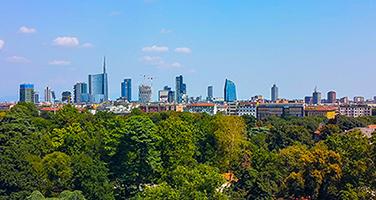MOOC List is learner-supported. When you buy through links on our site, we may earn an affiliate commission.

MOOC List is learner-supported. When you buy through links on our site, we may earn an affiliate commission.
The megatrends are clear: by 2050, 84% of the European population will live in urban areas, while air pollution and climate change will continue to harm the health of European citizens. Despite minor improvements, pollution levels that regularly exceed the European Union (EU) limits as well as heatwaves endanger the lives of especially young and elderly people. Urban forests are effective Nature-Based Solutions (NBS) that help mitigate the effects of climate change while improving air quality, urban temperature, and lifestyle of modern cities. Many global cities across the globe are setting ambitious urban reforestation targets while struggling to face related costs and citizens' engagement to meet current changing and future needs. On the other hand, urban planning and forest sciences have failed to provide interdisciplinary training to engage with innovative public-private urban forestry (UF) initiatives and trends. This course focuses on introducing the concept of Urban Forestry (UF), exploring the different and closely interrelated topics that constitute the foundations of this field. As Urban Forester, you will have to learn how to think and act with an interdisciplinary approach, cooperating with other specialized professionals to develop effective and sustainable solutions for our cities. In addition, you will learn to face the complex situations that are common when planning and managing forest and tree-based systems in urban and periurban environments. By attending this MOOC, watching and reading all the contents included, and participating in the activities proposed, you will improve your understanding of:
- what Urban Forestry is, the variety of disciplines involved and the competencies achieved;
- the importance of developing a transdisciplinary mindset to work in Urban Forestry;
- the main aspects to be considered while developing an Urban Forestry project
The course is designed as a choral MOOC based on the valuable experiences of international experts. Real case studies offer a compelling picture of challenges and strengths that needs to be considered when designing a new initiative on Urban Forestry. The MOOC is a component of the European Innovation Programme on Urban Forestry 4.0 dedicated to university students.
This MOOC is provided by Politecnico di Milano in collaboration with Ente Regionale per i Servizi all’Agricoltura e alle Foreste (ERSAF), Etifor | Valuing Nature, The European Forest Institute (EFI), The Universitat Autònoma de Barcelona (UAB), CREAF, AGRESTA Forest solution for the future, Transilvania University of Brașov (UNITBV), Forest Design, Trinity College Dublin, Nature Based Solutions Institute, Green City Watch.
The course is structured in 7 Weeks:
Week 0 – Introduction to the course
Week 1 - History of urban forestry
Week 2 – Urban Forestry planning and design
Week 3 – Urban forest ecology
Week 4 – Socioeconomics - Governance and community engagement
Week 5 – Entrepreneurship and innovation
Week 6 - Final assessment
Week 7 - Live events - Urban Forest Case Studies
The weeks include different lessons :texts, videos, quizzes, individual self-reflection exercises, and discussion with peers. There are also:
two live events focused on exploring innovative case studies and deepening the strengths and challenges of Urban Forestry projects;
additional resources, collected in the Explore more session, to achieve a greater level of awareness of the topics.
For all intents and purposes, these events and additional resources are part of the contents of the course and of the assessment. We advise you to follow the pathway linearly, but you can freely move between content, if it is more useful for you. It is important that you keep your own pace: the length indications are a rough estimate, but your pace should guide you at best for the enjoyment and the individual reflection on the topics covered.
MOOC List is learner-supported. When you buy through links on our site, we may earn an affiliate commission.
MOOC List is learner-supported. When you buy through links on our site, we may earn an affiliate commission.
